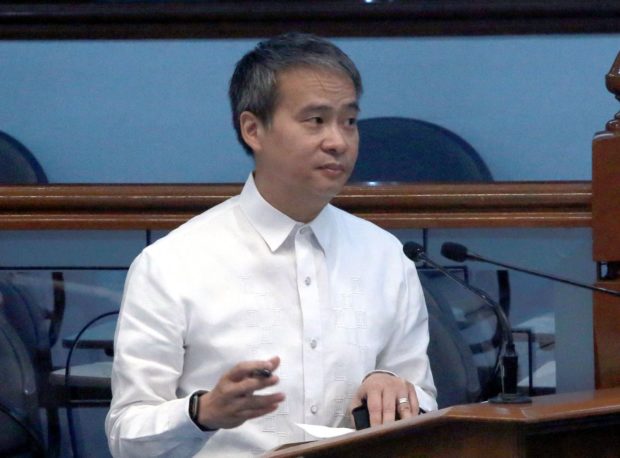
Sen. Joel Villanueva says scrapping the licensure examinations in the country may affect the reputation of our professionals working, or wishing to work, abroad. Senate PRIB file photo / Alex Nueva España
MANILA, Philippines — Senator Joel Villanueva on Thursday warned that removing board examinations can harm the reputation of Filipino professionals abroad.
“[W]e cannot totally remove the certifying process because it will be unfair to our people, and is a betrayal of their trust, as they expect their government to test the knowledge of these professionals if they are indeed qualified to practice,” Villanueva, chairman of the Senate labor committee, said in a statement.
“The repercussions of this proposal, if adopted, will also harm the OFW [overseas Filipino workers] brand, as many of them were able to land jobs abroad because of a good reputation of having been properly certified,” the senator added.
Villanueva issued the statement after Labor Secretary Silvestre Bello III earlier questioned the need for such examinations.
The labor chief clarified that he has not made any proposal to scrap the board examinations but has only urged concerned agencies to study if the requirement can be abolished.
Final ‘quality control’
Villanueva said that while he understands Bello’s sentiment that there should be “urgent reforms” to make licensure exams more accessible to takers, the senator said such tests should remain.
“Despite our disappointment with how the PRC [Professional Regulation Commission] has been failing our graduates with the way they’ve postponed and pushed back scheduled board exams since last year, it is very clear to us that the professional certification exams such as the various board exams must remain,” he said.
“It is the final ‘quality control’ check before we allow graduates to practice a profession, which depends on the lives of the people—like physicians—or safety of buildings, like engineers. If tech-voc [technical-vocational] graduates, like mechanics who fix cars, require [Technical Education and Skills Development Authority] certification, how much more for doctors who will repair hearts?” he added.
The senator noted that he earlier filed a Senate resolution seeking to help the PRC identify alternative ways of conducting board exams amid the pandemic and the new normal.
The lawmaker pointed out that under the PRC Modernization law of 2000, the commission was mandated to shift to full computerization of all licensure examinations by 2003.
“Computerization will also help disaster-proof our professional licensure system, as typhoons and floods often wreak havoc on testing schedules and sites,” he said.
Villanueva pointed out that the “failed implementation” of computerized board examinations is now affecting 2020 graduates as the pandemic triggered restrictions on movement, thus affecting the conduct of licensure exams.
“We think there is a lot of room for improvement for the PRC, and to address the problems, we need to evaluate suggestions. If our professional regulatory laws need amending, we’re ready to buckle down to work,” the senator said.